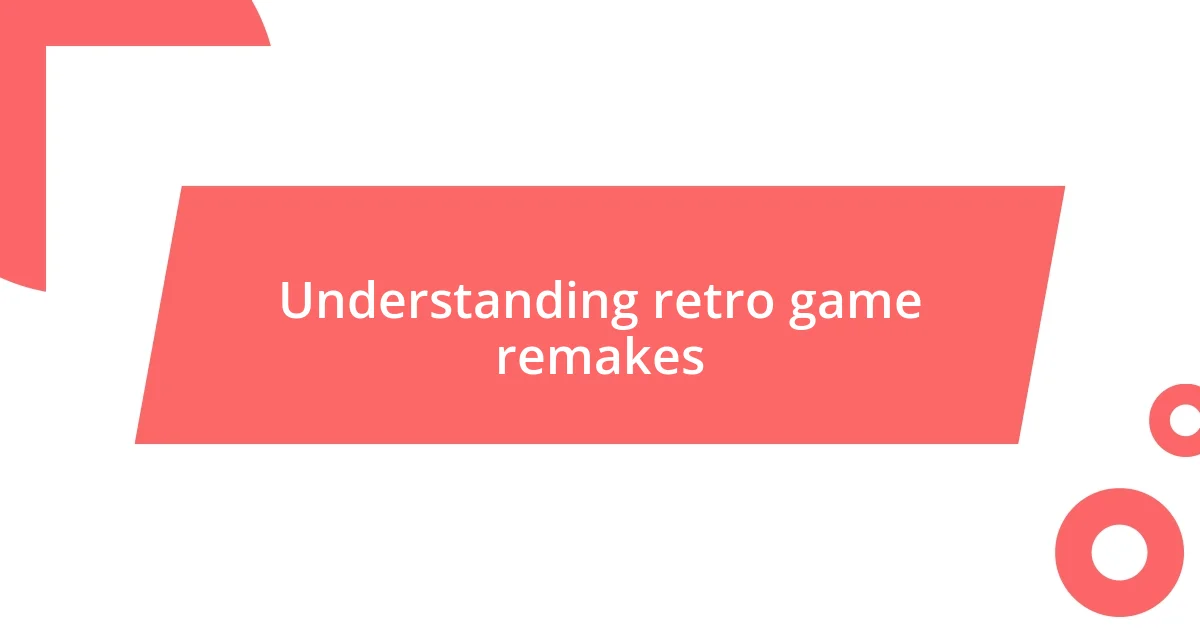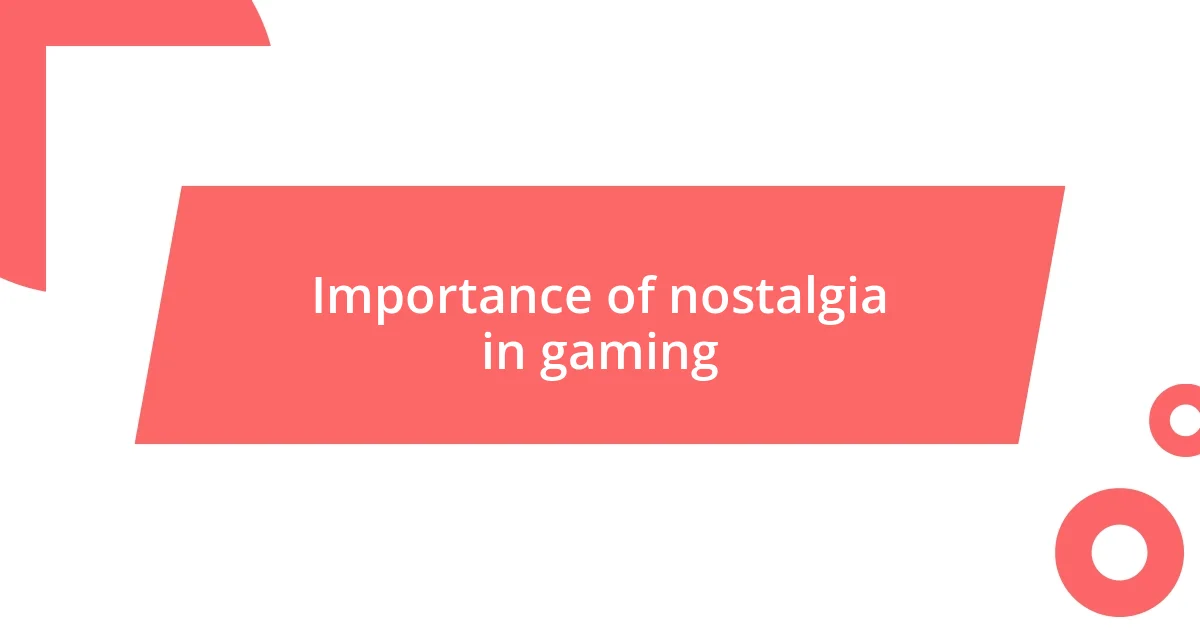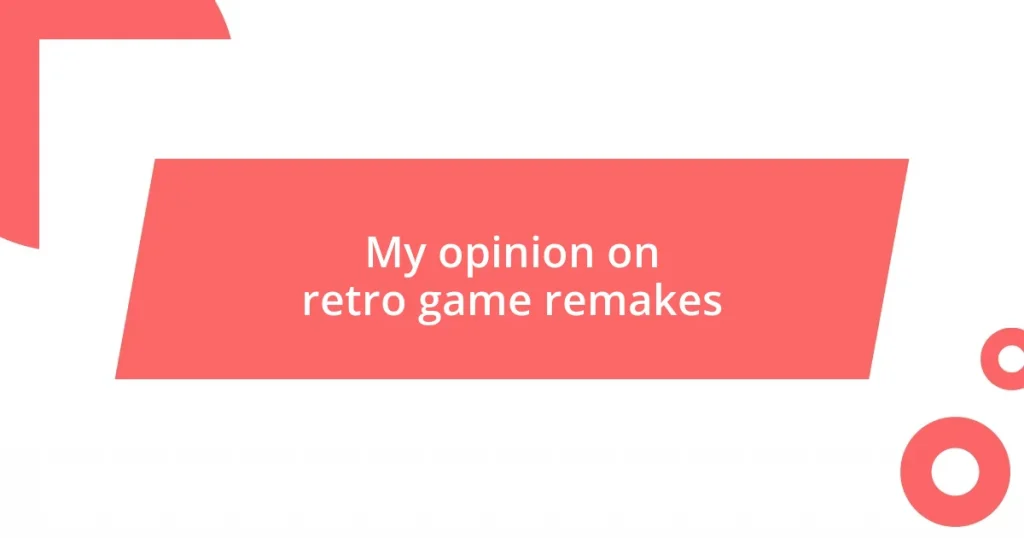Key takeaways:
- Successful retro game remakes balance nostalgia with modern innovations, ensuring they maintain the essence of the original while enhancing visuals and gameplay.
- Nostalgia deeply influences gaming experiences, evoking emotional connections, fostering community bonding, and reflecting cultural relevance.
- Critiques of remakes often focus on narrative deviations, over-reliance on nostalgia without quality gameplay, and the challenge of balancing difficulty for new and returning players.

Understanding retro game remakes
Retro game remakes are fascinating because they bridge the gap between nostalgia and modern gaming innovations. I remember the first time I played a remake of a classic title; it felt like revisiting an old friend but with new clothes. It’s incredible how developers can breathe fresh life into beloved games, enhancing graphics and gameplay while retaining the charm that made them special.
The challenge lies in capturing the original game’s essence while making it appealing to a new generation. Have you ever played a remake and thought, “This is not how I remembered it”? I’ve had that experience, and it can be bittersweet when the modern version strays too far from what I loved as a kid. Balancing nostalgia with innovation is a delicate dance—one that requires a deep understanding of both the original and the expectations of today’s players.
Each remake tells a story, not just of the game itself, but also of the culture around it. For instance, my heart races at the thought of updated soundtracks that remix iconic tunes—there’s something exhilarating about hearing those familiar notes reimagined. It’s a chance for developers to honor the legacy while inviting us to explore these worlds anew, sparking joy and, sometimes, even sparking debate among fans.

Importance of nostalgia in gaming
Nostalgia plays a powerful role in gaming, acting like a universal language that connects players across generations. I often find myself reflecting on the sense of comfort that comes from revisiting a classic game; it’s like a warm hug from the past. The memories tied to those games are not just about the mechanics or graphics—they’re intertwined with the friendships, experiences, and emotions we associate with them. When developers tap into that nostalgia, they’re really tapping into something that resonates deeply within us.
Consider how nostalgia impacts our gaming choices:
- Emotional Connection: Remakes evoke strong feelings, often transporting us back to simpler times.
- Community Bonding: Sharing memories of original games fosters camaraderie among players.
- Cultural Relevance: Nostalgic games often reflect the cultural context of their time, providing insight into our past.
Every time I hop into a remake, I find myself not just playing a game, but also reliving a snapshot of my life, which makes each gaming session feel rich with meaning.

Key elements of successful remakes
Successful retro game remakes hinge on a few key elements that ensure they resonate with both long-time fans and newcomers. One essential factor is fidelity to the original game’s core mechanics and spirit. I remember playing a remake where the developers messed with the gameplay too much; it felt more like a different game altogether, rather than a cherished classic. It’s crucial that remakes maintain the essence while embracing necessary updates.
Another vital element is visual and audio enhancement. Modern graphics can do wonders for bringing a game to life, but I always appreciate when developers find the right balance in visuals without losing the original art style. A stellar example is when soundtracks get reimagined—updating them while keeping that nostalgic flair adds layers to the experience. The latest remake I played truly nailed that blend; the music made me smile, feeling both familiar and fresh.
Lastly, community engagement is pivotal. Developers that actively involve players in discussions about what they want to see in remakes create an inclusive environment. I recall participating in forums before a beloved title was remade, eagerly sharing my thoughts and hearing how others felt. That connection fosters anticipation and deepens the emotional investment in the game’s release, turning it into a shared experience.
| Key Element | Description |
|---|---|
| Fidelity to Core Mechanics | Maintaining the essence while updating gameplay. |
| Visual and Audio Enhancement | Improving graphics and sounds while respecting the original style. |
| Community Engagement | Involving players in discussions to foster connection and anticipation. |

Innovations in modern remakes
When we look at modern remakes, it’s fascinating to see how developers blend innovations while still honoring the nostalgia of the originals. I vividly remember playing a remake that introduced dynamic storytelling elements—faxing the original game’s plot with branching paths that kept me on the edge of my seat. It struck me how these modern choices could enhance engagement without overshadowing the essence of the classic.
Incorporating online multiplayer features is another game-changer I’ve noticed. I used to play solo for hours, lost in my own world, but when a remake added cooperative gameplay, it transformed my gaming experience. Suddenly, I was teaming up with friends to tackle challenges, reigniting that communal spirit that I cherished from my youth. Isn’t it amazing how technology can deepen our connections to the games we love?
Lastly, let’s talk about accessibility options. A recent remake I played was truly impressive in this regard, offering various modes for different playstyles and needs. It made me reflect on how important it is for all players to have the chance to enjoy these timeless classics. The inclusion of features like colorblind modes and customizable controls really emphasizes that gaming is for everyone, don’t you think?

Critiques of popular remakes
While discussing critiques of popular remakes, I’ve often felt that one major complaint centers around developers straying too far from the original narrative. Take, for instance, the remake of a beloved horror game. I was eager to relive the spine-chilling moments, but the new storyline threw a curve that left me scratching my head. It felt like they had tossed out the very elements that made the original’s tension so palpable. Have you ever experienced the frustration of a remake that felt like a betrayal of its roots?
Another critique I frequently hear from fellow gamers involves the over-reliance on nostalgia as a marketing tool. Yes, nostalgia can bring in the masses, but when games use it as a crutch without delivering quality gameplay, it’s disheartening. I recall a remake that was heavily marketed with iconic imagery from my childhood, but once I dove in, the gameplay felt stale. For a moment, I wondered if my fond memories were clouding my judgment, but ultimately, the lack of engaging mechanics confirmed my concerns. How do you feel when a remake falls flat despite its nostalgic packaging?
Moreover, there’s the issue of balancing difficulty. Some remakes attempt to cater to a new audience by toning down challenges, but this often leaves long-time fans feeling unfulfilled. I distinctly remember playing a reimagined classic that felt way too easy compared to the nail-biting experience I had back in the day. I found myself breezing through levels that once had me sweating bullets, and it raised the question: should developers prioritize accessibility over the original game’s challenge? Finding that balance is crucial for preserving what made the original special while welcoming a new generation of players.

My personal favorites in remakes
One of my all-time favorite remakes has to be Final Fantasy VII Remake. I remember picking up the original as a kid and getting lost in its world, but the remake elevated that experience beyond what I imagined. The enhanced graphics and reimagined combat system made the gameplay feel alive, and I found myself investing even deeper into the characters’ stories. Isn’t it incredible how a modern touch can breathe new life into a classic?
Another remake that truly resonated with me was the Resident Evil 2 remake. My heart raced as I navigated the eerie hallways of the Raccoon City Police Department once again. The combination of updated graphics and improved sound design amplified the tension, making every footstep echo with suspense. I couldn’t help but reminisce about countless sleepless nights spent on the original—all those moments of fear came flooding back. Isn’t it fascinating how our emotions remain tied to these experiences, no matter how many years pass?
Lastly, I find myself continually drawn to The Legend of Zelda: Link’s Awakening remake. The charming art style and music brought me right back to my childhood, yet with a fresh twist. I was surprised by the inclusion of new features that made exploring Koholint Island feel like both a nostalgic trip and an exciting adventure all over again. Have you ever felt that rush of joy when an old favorite is reimagined beautifully, allowing you to fall in love with it all over again?















